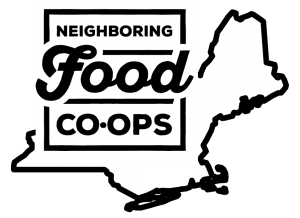 Your Neighboring Food Co-ops
Your Neighboring Food Co-ops
Locally Owned by More Than
150,000 People Like You!
In this Month’s E-News, check out:
- Co-op’s Concern for Community & COVID19
- The Neighboring Co-operator Award Goes to…
- Farm to Freezer: Supporting Our Regional Food System
- April’s Cave to Co-op Cheese Special
- New England Farmers Union: Pandemic Rankles Food Supply Chain
- Our Neighborhood Co-op Calendar
Co-op’s Concern for Community & COVID19
The impacts of COVID-19 are likely to be felt for some time. But by working together, we can care for one  another and limit its impacts on our communities, local economies, and the food system that we all depend on.
another and limit its impacts on our communities, local economies, and the food system that we all depend on.
In this challenging time, our co-ops have never been more important to our communities, ensuring access to good food, providing local jobs, and sustaining outlets for local farmers and producers while protecting our members, shoppers, and employees. Food co-ops are central to the effort to reduce the impact of this pandemic, and co-operation will be crucial to rebuilding local economies and resilient communities in its aftermath.
Concern for Community is at the heart of the co-operative movement. Because we are community-owned, our priority is serving our members and ensuring that our local economy continues to thrive. Learn more about how our food co-ops are stepping up to serve and protect their communities, and how YOU are key to this effort.

Thanks to CoBank for their support of our Neighboring Food Co-ops
The Neighboring Co-operator Award Goes to…
We are excited to announce that the recipient of the Neighboring Co-operator Award for 2019 is Joanne Todd, current Director and Treasurer at Willimantic Food Co-op, and former Board Director of the NFCA.
The “Neighboring Co-operator Award” acknowledges special contributions made to the Neighboring Food Co-op Association (NFCA) and the advancement of our vision by a staff member, director or member of a 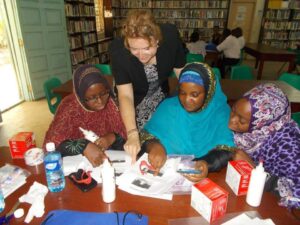 Member Co-op or partner organization. In honor of the recipient and as part of our commitment to co-operative education, the NFCA makes a donation to the Howard Bowers Fund, which is hosted by the Cooperative Development Foundation (CDF) and supports the training and education of staff and board members of food co-operatives. The NFCA invites members of our community, including individuals, co-ops and other organization, to make additional contributions in the recipient’s honor. Honorees also receive a special co-op themed ceramic dish, hand thrown by Shelburne Falls, MA, potter Stephen Earp, in appreciation.
Member Co-op or partner organization. In honor of the recipient and as part of our commitment to co-operative education, the NFCA makes a donation to the Howard Bowers Fund, which is hosted by the Cooperative Development Foundation (CDF) and supports the training and education of staff and board members of food co-operatives. The NFCA invites members of our community, including individuals, co-ops and other organization, to make additional contributions in the recipient’s honor. Honorees also receive a special co-op themed ceramic dish, hand thrown by Shelburne Falls, MA, potter Stephen Earp, in appreciation.
In addition to her service to the food co-op community, Joanne Todd serves as President and CEO of Northeast Family Federal Credit Union and has been a strong proponent of cross-sector collaboration in the co-operative movement. More recently, Joanne played a key role in the NFCA’s efforts to support legislation enabling co-ops to grow and thrive in our region, helping to coordinate the advocacy efforts of Willimantic Food Co-op, Fiddleheads Food Co-op, and other partners including the Credit Union League of Connecticut in the successful passage in 2019 of Substitute Bill (SB) No. 138: “An Act Modernizing the State’s Co-operative Association Statutes.” The signing of this bill by Governor Ned Lamont marked the first update of this law in over 40 years and demonstrated the potential of our co-ops and partner organizations in influencing policy and opening the way for co-operative development by removing unnecessary obstacles to existing co-ops and startups.
Joanne’s passion and service reaches far beyond our community of food co-ops, and we would be remiss if we were not to share her work with American Friends of Kenya (AFK). This organization, which began as an informal effort to support a Kenyan couple living in Connecticut who wanted to help build school and community libraries in Kenya, collects and sends regular shipments of books, library materials, school supplies, and medical supplies to schools, libraries, hospitals, and clinics, organizes an “Orphan Sponsorship Program” that helps children in several provinces of Kenya, and worked to expand opportunities for girls and women and people with disabilities. (In the photo above, Joanne is working with AFK partners repairing books at a library workshop in Likoni, Kenya.) AFK coordinates hundreds of volunteers from all over the world and annual service visits to Kenya with participants from many different states in the U.S., from Canada, and Australia. For more information, visit http://afkinc.org.
Joanne joins a growing family of Neighboring Co-operators who have made extraordinary contributions to our work together, including Alex Gyori, former General Manager of Brattleboro Food Co-op and a founding NFCA Board Director; Terry Appleby, former General Manager of Co-op Food Stores / Hanover Consumer Co-operative Society; Kay Litten, past Board Director of the NFCA and Co-op Food Stores, Hanover Consumer Co-operative Society; Roger Noonan, organic farmer and President of the New England Farmers Union; and Patrice Lockert Anthony, past Board President of GreenStar Food Co-op.
About the Howard Bowers Fund
The Howard Bowers Fund supports the training and education of staff and board members of food co-operatives, offering the kind of assistance food co-ops need to open strong and stay competitive and providing over $500,000 in grants since 1994. The Fund:
- Assists with staff and board training and scholarships to attend professional conferences that allow them to network with peers and learn from industry experts
- Each year, the Bowers Fund offers 25 scholarships to CCMA, and provides over $35,000 in grants.
- Supports participation in Up and Coming and Small and Strong Conferences
For more information and to make a donation to the Howard Bowers Fund in honor of Joanne Todd, please visit https://www.cdf.coop/bowersfund, scroll down to the “Neighboring Co-operator” section of the page, and click on “Donate to Honor the Neighboring Co-operators“.
Now Offering Personal Impact Deposit Accounts

Open an account today and help increase access to local, healthy food, deliver health care to more people, create affordable housing and build renewable energy. Your Choices Reflect Your Values. Your Bank Should Too. Check our rates and Open an Account today.
Farm to Freezer: Supporting Our Regional Food System
Support Farms Year-Round: Get local Frozen Fruits & Veggies from Your Food Co-op.
These are challenging times. We face challenges at home as we deal with the uncertainty of work, school,  health, and social change. Our food co-ops have been long been places of social connectivity, connecting with our community members and those who grow and prepare our food. As we head into the growing season in the Northeast, farmers are working to meet today’s challenges amidst the usual seasonal variations and worry about getting their crops to consumers.
health, and social change. Our food co-ops have been long been places of social connectivity, connecting with our community members and those who grow and prepare our food. As we head into the growing season in the Northeast, farmers are working to meet today’s challenges amidst the usual seasonal variations and worry about getting their crops to consumers.
Now, more than ever, is a time to support our regional food system. Demand for Neighboring Food Co-op Association (NFCA) frozen vegetables by customers was high last month and co-op staff have been working hard to keep items we need on the shelf. Food co-ops have historically been outlets for local and regional producers and growers recognizing the importance of building our regional food system not just for usual times but for the challenging times like today. A focus of the NFCA has been working together with our co-ops and partners to build a stronger, more resilient regional food system.
With decreased outlets for farmers it is even more critical that our co-ops prioritize purchasing from local and regional farmers. Over the last four years, food co-op consumers have purchased 15 tons of regional frozen fruits and vegetables through the NFCA Farm to Freezer program, just one way to support farms year-round! Our farmers work hard to bring us fresh fruits and vegetables throughout the season so while we wait for the next season of fresh produce, we can choose NFCA frozen Blueberries, Organic Edamame, non-GMO Sweet Corn and Green Peas, supporting family farmers all year long and continuing to build our regional, resilient food system.
For more Farm to Freezer information and recipes—including comfort foods—visit: www.nfca.coop/farmtofreezer and these Co+op Stronger Together recipes.

Thanks to Cooperative Development Foundation for their support of our Neighboring Food Co-ops
April’s Cave to Co-op Cheese Special
Mad River Blue, von Trapp Farmstead, Waitsfield, Vermont
Mad River Blue is a natural-rinded blue cheese, aged for approximately three months. It is made with the 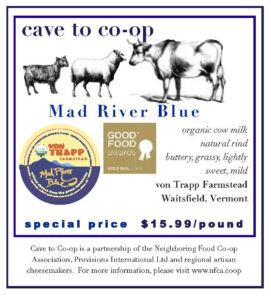 farm’s certified organic cow milk by cheesemaker Sebastian von Trapp. This blue is very approachable with a mild blue bite but interestingly complex flavor profile and unique creamy texture.
farm’s certified organic cow milk by cheesemaker Sebastian von Trapp. This blue is very approachable with a mild blue bite but interestingly complex flavor profile and unique creamy texture.
In 2015, Mad River Blue won a Good Food Award. These awards celebrate the accomplishments of authentic food producers who combine great flavor with environmental and social responsibility. The cheese is appropriately named for a variety born in the Mad River Valley. In 2016 Mad River Blue won second place at the American Cheese Society Awards, and first place in 2019!
Cave to Co-op is a partnership between Provisions International and the Neighboring Food Co-op Association (NFCA) to support artisanal cheese producers in our region and make their products more easily available to co-op shoppers. Since the program’s incept, ten years ago, 26 tons of cheese have been sold through the Cave to Co-op program. That is a lot of delicious cheese!
For more information on Cave to Co-op, visit: www.nfca.coop/CaveToCo-op
It’s not too warm for baking! Check out this lovely recipe:
Warm Chocolate Cakes with Mad River Blue
Serves 4
Pre-heat oven to 400°
- melted butter and cocoa powder for the ramekins
- 4 ounces dark chocolate
- 4 ounces unsalted butter, cubed
- ½ cup sugar
- 2 large eggs and 2 egg yolks
- ½ cup unbleached flour
- 2 ounces Mad River Blue, crumbled
Brush the inside of four 4-ounce ceramic ramekins with butter and dust with cocoa. Press a few bits of Mad River Blue into the sides of the ramekins. Put the ramekins in the freezer while you make the recipe.
Melt the butter and chocolate, stirring until very smooth. Using an electric mixer, beat the sugar, eggs and yolks for 3-5 minutes, until double in volume and very thick. Gently fold in the flour and the remaining blue cheese, leaving four larger pieces aside. Remove the ramekins from the freezer and evenly fill with batter, Place the remaining cheese evenly on top of each. Place ramekins on a baking tray and bake for 12 minutes. Remove from oven and let sit for one minute. Serve in the ramekins or gently unmold them upside down on serving plates. Dust with confectioner’s sugar.

Thanks to New England Farmers Union for their support of our Neighboring Food Co-ops
New England Farmers Union: Pandemic Rankles Food Supply Chain
The pandemic is affecting our supply chain. How are regional farmers responding?
Demand for pantry staples is soaring, causing prices to skyrocket and leaving and grocery stores 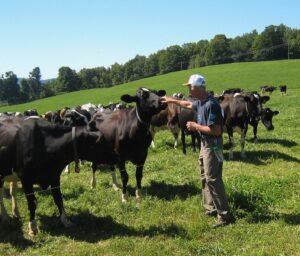 scrambling to restock shelves. At the same time, farmers are earning substantially less for most commodities than they were a few short weeks ago and some are even dumping excess crops and milk.
scrambling to restock shelves. At the same time, farmers are earning substantially less for most commodities than they were a few short weeks ago and some are even dumping excess crops and milk.
These two realities seem incongruous – too much food in one, and too little in the other. But there’s a simple explanation: consumption patterns have changed drastically, and supply chains are struggling to adapt.
Typically, consumers purchase roughly half of their food in retail settings – grocery stores, bodegas, and super centers – and the other half in commercial settings – restaurants, schools, hospitals, and hotels. But stay at home orders and the closure of non-essential businesses has all but eliminated the latter category, shifting almost all food consumption to the former. But our distribution system isn’t built for such an abrupt and radical transition.
Though many farmers can sell to both commercial and retail clients, the rest of the supply chain is not quite as versatile. In most instances, the commercial supply chain and the retail supply chain operate separately – they largely depend on different processors, packers, and distributors. On top of that, food intended for commercial sale is often packaged in large serving sizes that are inappropriate for individual consumers. Consequently, it can be a logistical headache to funnel food from the commercial food supply chain to retail outlets.
So despite best efforts to redirect surpluses to the places they’re needed, grocery stores and food pantries are dealing with food shortages while a lot of food elsewhere is going to waste. The most obvious example of this is dairy: about a third of milk is sold to the food service industry or to institutions like schools and hospitals. With widespread closures, those markets have evaporated. Milk prices have accordingly dropped about 30 percent to less than $13 per hundredweight, well below the cost of production.
Seafood consumption – 70 percent of which occurs outside the home – has been even more significantly affected. Some fisheries are reporting that their sales are just 5 percent what they were before the pandemic started. Those hit hardest have been producers of luxury products like lobster, crab, tuna, and oysters, which aren’t sold in most grocery stores. Without a market, fishermen have started freezing their catch and laying off employees.
Farmers, particularly those who grow products that don’t need to be processed or packaged before being sold, have been able to adjust quickly. In lieu of restaurant and school sales, some producers have started selling directly to consumers via drive through CSAs, no-contact delivery services, and online stores. But others aren’t as well equipped to modify their sales structure. Dairy farmers, for instance, can’t legally transport or sell their own milk in many states. They instead sell their milk to a processor, who homogenizes, pasteurizes, packages the final product. If a processor stops picking milk up from a farmer, farmers have no choice but to dump the excess milk. (It can’t easily be stored, either, because milk is highly perishable.)
Modifications are happening elsewhere along the supply chain to transport food to where it’s needed most. Commercial processors have been working to scale down packaging to sizes more suitable for individual consumers. The U.S. Department of Agriculture (USDA) has also stepped in to facilitate greater flexibility by temporarily relaxing certain labeling requirements and redistributing eggs from foodservice warehouses to retail supply chains. To ensure that farmers are still able to get their food to consumers, National Farmers Union (NFU) is both encouraging states and cities to keep regulatory pathways for local markets open as well as urging USDA to find other opportunities to step in to purchase commodities where there’s oversupply and distribute them to grocery stores and food banks that haven’t been able to keep up with growing demand.
New England Farmers and Farm Businesses — New England Farmers Union wants to know how you, your family, business and community are being impacted by the pandemic so we can inform policy makers how best to serve the needs of our communities. Let us know the current challenges you are facing and what you need to deal with the evolving crisis. Be safe and kind to each other, we are all in this together! Please take a moment to share your story with us: https://newenglandfarmersunion.org/covid-19-response/
Our Neighborhood Co-op Calendar
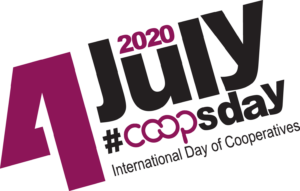 Co-ops for Climate Action!
Co-ops for Climate Action!
On Saturday, July 4th, your Neighboring Food Co-ops will join with the United Nations, the International Co-operative Alliance, and co-operatives and credit unions around the world in celebrating International Co-ops Day. This year’s theme, Co-ops for Climate Action, highlights the role of co-operatives as a more sustainable way of doing business as we work to address the challenges of climate change.
For More Co-op Events, Visit https://nfca.coop/calendar
MAY 2020
Saturday, May 16
NFCA Food Co-op Startup Gathering
Join us for a morning of virtual training and networking for NFCA member food co-op startups. Email Bonnie Hudspeth for more details: bonnie@nfca.coop
JUNE 2020
June 8-12
Virtual CCMA for Food Co-ops Conference
JULY 2020
July 4
International Co-ops Day: Co-ops for Climate Action!
AUGUST 2020
August 13-15
Federation of Southern Co-operatives 52nd Annual Meeting
https://www.federation.coop/events
OCTOBER 2020
October 7-9
NCBA CLUSA Co-op Impact Conference, Washington, DC
https://ncbaclusa.coop/2020-co-op-impact-conference/
October 8
Co-operative Hall of Fame, Washington, DC
Saturday, October 17
Columinate Co-op Cafe (Co-Hosted by NFCA)
https://columinate.coop/upcoming_events/co-op-cafe-new-england/
The Neighboring Food Co-op Association (NFCA) is a co-operative federation of 35 food co-ops and startup initiatives across New England, working together toward a shared vision of a thriving co-operative economy, rooted in a healthy, just, and sustainable food system and a vibrant community of co-operative enterprise.

